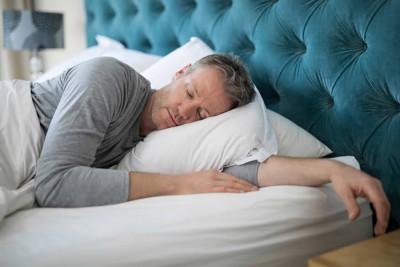
Insomnia affects more than 30% of the population at some time in their lives, and up to two-thirds of people over 60. Sleep deprivation is linked to obesity, depression, car crashes and other threats to longevity. There is no magic cure for chronic insomnia–even sleeping pills stop working after a while and can be dangerously addictive.
The most effective way to stop insomnia is to combine medication with behavioral approaches to retrain your brain to fall asleep and to stay asleep.
Sleep regularly. Sleep is controlled by one of the more primal areas of the brain, which produces the hormone melatonin. Going to bed at the same time each night stimulates the brain to produce melatonin at the right time. It’s tempting to sleep in after sleep-deprived nights, but it usually backfires. It throws your body further off its natural rhythm, making it harder to fall asleep that night.
Make a pre-bed routine. Do the same relaxing activity each night, such as having a warm bath, reading a good book, or meditating. Whatever pre-bed routine you choose, try to follow it every night to train your brain to recognize the signals of going to sleep.
When you wake up, get up. Lying awake teaches your body to stay awake in bed. If you wake up in the middle of the night, allow yourself 10-15 minutes to fall asleep again. If you’re still wide awake, get up and do something relaxing before trying again. The more time you spend trying to fall asleep , the more anxious you will feel, and the harder it will be to sleep.
Don’t nap. Short daytime naps only reinforce your body’s habit of waking up as soon as you reach a period of lighter sleep, and make it harder to fall asleep at night.
Exercise at the right time. Exercise can tire you out physically as well as mentally, making it easier to fall asleep, but don’t exercise too close to bedtime. Exercise produces a rush of endorphins, a stimulant that can keep you awake.
Shut off your screen. The blue-ish light from cellphones and computer screens contributes to insomnia.
Using Sleeping Aids to Stop Insomnia:
None of the sleeping aids on the market are magic cures, but they can help when used together with the sleep tricks above.
Hypnotherapy
Because sleep is controlled by a deep-seated, primal area of the brain, hypnotherapy can be very effective. However, some people are more susceptible to hypnotherapy than others.
Aromatherapy
Rubbing relaxing essential oils like lavender onto your wrists, adding a few drops to a warm bath, or scenting your pillow can help you relax enough to fall asleep.
Herbal teas
Sleepytime tea, marketed by Celestial Seasonings, and regular chamomile tea are both said to help people fall asleep. Just make sure there is no hidden caffeine, or you’ll defeat the purpose. Note: Before using herbal remedies, read the directions carefully. If you are taking any medication, consult your physician before taking any herbal remedy.
Warm milk
The amino acid Tryptophan that’s found in milk does help produce the sleep hormone melatonin, so warm milk could really help you to sleep.
Melatonin
Many people who suffer from insomnia have an imbalance in their body’s production of melatonin. Sometimes, a melatonin supplement can correct that imbalance and cure insomnia. Melatonin should only be taken with a doctor’s advice, and make sure to follow the instructions.
Sleeping pills
Sleeping pills have their place in a battle against insomnia, but they should not become a crutch. if used wisely, they can allow you to relearn better sleep habits. It’s better to take one every now and then when you really need a good night’s sleep than to take them regularly. This way you won’t risk becoming addicted. Because anxiety over being able to fall asleep often makes insomnia worse, just knowing that you can get a good night’s sleep can short-circuit your anxiety and help you to sleep better at night.
What is your trick to sleeping better at night?
By Faigie Horowitz, MS
A veteran nonprofit leader, Faigie Horowitz, MS is a columnist, motivational speaker and active community rebbetzin in Lawrence, NY.
The Inside Tricks To Healthy Sleep Habits
Typography
- Smaller Small Medium Big Bigger
- Default Helvetica Segoe Georgia Times
- Reading Mode

